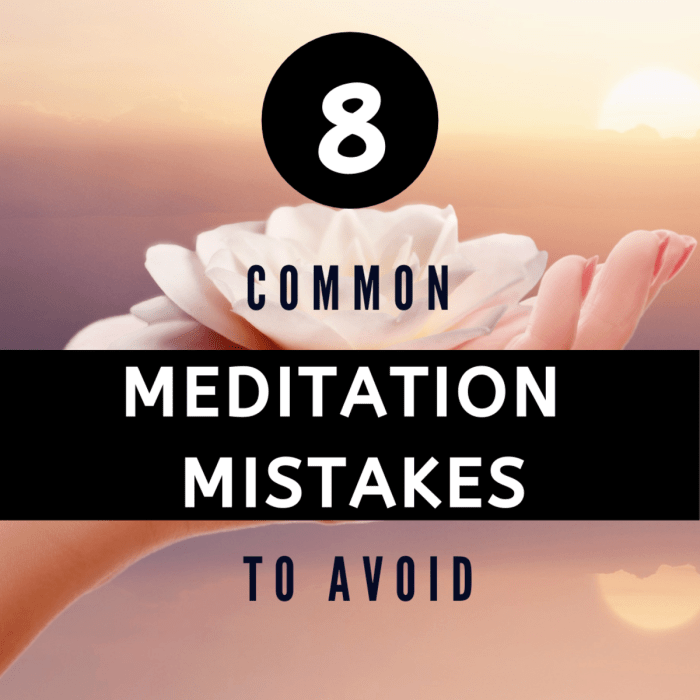8 Common Meditation Mistakes and How to Avoid Them: Essential Tips. Delve into the world of meditation as we uncover the most prevalent errors and provide valuable insights on how to steer clear of them.
Discover the key to a successful meditation practice by understanding and overcoming these common blunders.
Common Meditation Mistakes

When it comes to meditation, there are common mistakes that many people make which can hinder their progress and overall experience. Avoiding these mistakes is crucial for a successful meditation practice.
1. Trying Too Hard
Some individuals push themselves too much during meditation, striving for a certain experience or outcome. This can lead to frustration and impede the natural flow of meditation.
2. Expecting Immediate Results
Many beginners expect instant gratification from meditation, but it is a practice that requires time and consistency. Patience is key in seeing the long-term benefits.
3. Getting Distracted Easily
It’s common to get distracted by thoughts, sounds, or physical sensations during meditation. Learning to acknowledge these distractions without judgment and gently refocusing is essential.
4. Sitting Uncomfortably
Physical discomfort can disrupt meditation sessions. Finding a comfortable sitting position or using props can help maintain focus and prevent unnecessary distractions.
5. Skipping Regular Practice
Consistency is vital in meditation practice. Skipping sessions or practicing irregularly can hinder progress and diminish the overall benefits of meditation.
6. Overthinking the Process
Overanalyzing the meditation technique or constantly evaluating the experience can create unnecessary stress. Letting go of expectations and simply being present is more effective.
7. Judging Experiences
Labeling experiences during meditation as good or bad can lead to attachment or aversion. Accepting each experience as it is without judgment helps cultivate a sense of equanimity.
8. Comparing Progress with Others
Each individual’s meditation journey is unique. Comparing your progress or experiences with others can create feelings of inadequacy or competition, which detract from the true purpose of meditation.
Lack of Consistency
Consistency is key when it comes to meditation practice. Without regularity, it can be challenging to experience the full benefits that meditation has to offer. Establishing a routine and sticking to it is crucial for progress and growth in your meditation journey.
Importance of Consistency
- Consistency helps in creating a habit: By meditating at the same time every day, you train your mind and body to expect and embrace this practice.
- It deepens your practice: Regular meditation allows you to go deeper into your mind, emotions, and thoughts, leading to a more profound experience.
- Improves focus and mindfulness: Consistent meditation enhances your ability to focus, be present, and cultivate mindfulness in your daily life.
Tips for Establishing a Regular Meditation Routine
- Set a specific time: Choose a time of day that works best for you and commit to meditating at that time every day.
- Create a dedicated space: Designate a quiet and peaceful area for your meditation practice to signal to your brain that it’s time to focus.
- Start small: If you’re new to meditation, begin with short sessions and gradually increase the duration as you become more comfortable.
- Use reminders: Set alarms or notifications to remind you to meditate, especially in the beginning when forming a habit.
Benefits of Maintaining a Consistent Practice
- Reduced stress and anxiety: Consistent meditation helps lower stress levels and reduces anxiety, leading to a calmer mind.
- Enhanced emotional well-being: Regular practice can improve mood, increase self-awareness, and promote emotional stability.
- Boosted overall health: Meditation has been linked to numerous health benefits, including better sleep, lower blood pressure, and improved immune function.
Setting Unrealistic Expectations: 8 Common Meditation Mistakes And How To Avoid Them
Setting unrealistic expectations in meditation can lead to frustration, disappointment, and ultimately giving up on the practice. When we expect immediate results or perfection from our meditation sessions, we set ourselves up for failure. It’s important to understand that meditation is a journey, and progress may not always be linear or immediately noticeable.
Impact of Setting Unrealistic Expectations
- Increased stress and pressure during meditation sessions.
- Feeling discouraged and demotivated when expectations are not met.
- Risk of abandoning the practice altogether due to perceived lack of progress.
- Difficulty in experiencing the present moment fully due to preconceived notions of how meditation should feel or what it should achieve.
Guidance on Setting Achievable Goals for Meditation
- Start with small, realistic goals such as sitting for 5 minutes a day or focusing on your breath without judgment.
- Focus on the process rather than the outcome. Embrace each session as an opportunity to learn and grow, regardless of how you feel afterwards.
- Be patient with yourself and understand that progress in meditation takes time. Celebrate small victories along the way.
- Practice self-compassion and let go of the need for perfection. Accept where you are in your meditation journey without judgment.
Personal Experiences of Overcoming Unrealistic Expectations in Meditation
- I used to expect meditation to immediately calm my racing thoughts and bring me a sense of peace. When I shifted my focus to simply observing my thoughts without judgment, I found more peace and acceptance in the process.
- By setting a goal to meditate for just a few minutes each day, I gradually built up my practice without overwhelming myself with unrealistic expectations of long sessions or profound insights.
- Letting go of the idea that meditation should look a certain way or produce specific results allowed me to approach each session with curiosity and openness, leading to a deeper connection with myself.
Distractions and Mind Wandering

Distractions and mind wandering are common challenges faced by individuals during meditation practice. These can disrupt the focus and lead to a less effective session. It is essential to address these issues to deepen the practice and experience the full benefits of meditation.
Common Distractions and Mind Wandering, 8 Common Meditation Mistakes and How to Avoid Them
- External noises or disturbances in the environment
- Physical discomfort or pain in the body
- Emotional thoughts and worries
- Daydreaming or planning future events
Techniques to Deal with Distractions
- Acknowledge the distraction without judgment and gently bring your focus back to the breath or mantra.
- Label the distraction (e.g., “thinking” or “feeling”) and then let it go, redirecting your attention to the present moment.
- Use grounding techniques such as focusing on the sensations of the body or the sounds in the environment to anchor yourself in the present.
Strategies for Maintaining Focus
- Set a specific intention or goal for your meditation session to help guide your focus.
- Practice mindfulness throughout the day to cultivate a greater awareness of your thoughts and emotions, making it easier to recognize and let go of distractions during meditation.
- Experiment with different meditation techniques to find the ones that work best for you and help you stay focused.
Incorrect Posture and Breathing

Proper posture and breathing are essential components of a successful meditation practice. They play a crucial role in helping you achieve a state of relaxation, focus, and mindfulness. Incorrect posture and breathing techniques can hinder your progress and diminish the benefits of meditation. Here are some tips on how to improve your posture and breathing during meditation:
Improving Posture
Maintaining a good posture during meditation helps in aligning your body and mind, promoting comfort and stability. Here are some tips to improve your posture:
- Sit comfortably with your back straight but not rigid, allowing for a natural curve in your spine.
- Keep your shoulders relaxed and your hands resting gently on your lap or knees.
- Place your feet flat on the ground or use a cushion for support if sitting cross-legged.
Enhancing Breathing Techniques
Proper breathing techniques can deepen your meditation experience and enhance relaxation. Here are some tips to improve your breathing during meditation:
- Focus on breathing deeply and evenly, inhaling and exhaling through your nose.
- Engage in diaphragmatic breathing by expanding your belly on inhalation and contracting it on exhalation.
- Count your breaths or use a mantra to maintain focus and regulate your breathing rhythm.
Correct posture and breathing can help you achieve a deeper sense of relaxation, focus, and mindfulness during meditation.
Overthinking and Overanalyzing
Overthinking and overanalyzing during meditation can hinder your ability to relax and focus, leading to increased stress and anxiety. Constantly analyzing your thoughts and trying to control them can create a barrier to achieving a peaceful state of mind. It can also result in frustration and a sense of failure when you can’t stop your mind from wandering.
Methods to Quiet the Mind and Reduce Overthinking
To quiet the mind and reduce overthinking during meditation, try the following techniques:
- Acknowledge intrusive thoughts without judgment: Instead of trying to push away your thoughts, simply acknowledge them and let them pass without attaching any meaning to them.
- Focus on your breath: Bring your attention back to your breath whenever you notice yourself overthinking. Concentrating on the sensation of breathing can help anchor your mind in the present moment.
- Practice mindfulness: Engage in activities that promote mindfulness, such as walking meditation or body scan exercises, to cultivate awareness and reduce overanalyzing tendencies.
- Use guided meditation: Listening to guided meditation sessions can provide structure and guidance, helping you stay focused and prevent overthinking.
Remember, the goal of meditation is not to stop your thoughts completely but to observe them without getting caught up in them.
Personal Anecdotes of Overcoming Overthinking
During my own meditation practice, I struggled with overthinking and found it challenging to quiet my mind. However, with consistent effort and patience, I learned to let go of the need to control every thought and instead embraced a more accepting attitude towards my mental processes. By incorporating mindfulness techniques and focusing on my breath, I was able to reduce overthinking and experience deeper states of relaxation during meditation.
Impatience and Rushing

Impatience and rushing during meditation can significantly impact the overall experience and effectiveness of your practice. When you are impatient and constantly rushing through the process, you are not allowing yourself to fully immerse in the present moment. This can lead to increased stress and frustration, hindering the potential benefits of meditation.
Cultivating Patience During Meditation
- Acknowledge the impatience: Recognize when impatience arises during meditation. Instead of resisting it, acknowledge it without judgment.
- Focus on the breath: Redirect your attention to your breath whenever impatience creeps in. Use the breath as an anchor to stay grounded in the present moment.
- Practice self-compassion: Be kind to yourself when impatience arises. Understand that it is a common challenge in meditation and part of the learning process.
- Extend the practice: Start with shorter meditation sessions and gradually increase the duration as you build your patience muscle over time.
Benefits of Embracing a Slow and Steady Approach
- Enhanced focus and concentration: By cultivating patience, you can improve your ability to focus and concentrate during meditation.
- Reduced stress and anxiety: Embracing a slow and steady approach can help alleviate stress and anxiety by promoting a sense of calmness and relaxation.
- Deeper self-awareness: Patience allows you to delve deeper into your thoughts and emotions, fostering self-awareness and personal growth.
- Long-lasting benefits: Consistently practicing patience in meditation can lead to long-lasting benefits that extend beyond your meditation sessions.
Lack of Proper Guidance

Seeking proper guidance in meditation is crucial for developing a consistent and effective practice. Experienced meditators or teachers can offer valuable insights, techniques, and support to help navigate the challenges that may arise during meditation. Their guidance can also enhance your understanding of different meditation styles and deepen your practice.
Importance of Seeking Guidance
- Experienced meditators can provide personalized advice based on your specific needs and goals.
- Teachers can offer corrections to your posture, breathing techniques, and overall approach to meditation.
- Guidance from seasoned practitioners can help you stay motivated and committed to your meditation practice.
Resources for Finding Reliable Meditation Guidance
It’s essential to seek guidance from reputable sources to ensure you receive accurate and beneficial instruction.
- Local meditation centers or yoga studios often offer classes with experienced teachers.
- Online meditation courses and resources from reputable websites can provide guidance from experienced practitioners.
- Books written by renowned meditation teachers can also offer valuable insights and guidance for your practice.
Benefits of Learning from Experienced Meditators
- Enhanced understanding of meditation techniques and their benefits.
- Improved focus and concentration during meditation sessions.
- Ability to navigate challenges and obstacles in meditation with more ease.
In conclusion, mastering the art of meditation involves recognizing and rectifying these mistakes to enhance your practice and experience lasting benefits. Dive deeper into your meditation journey armed with this newfound knowledge.